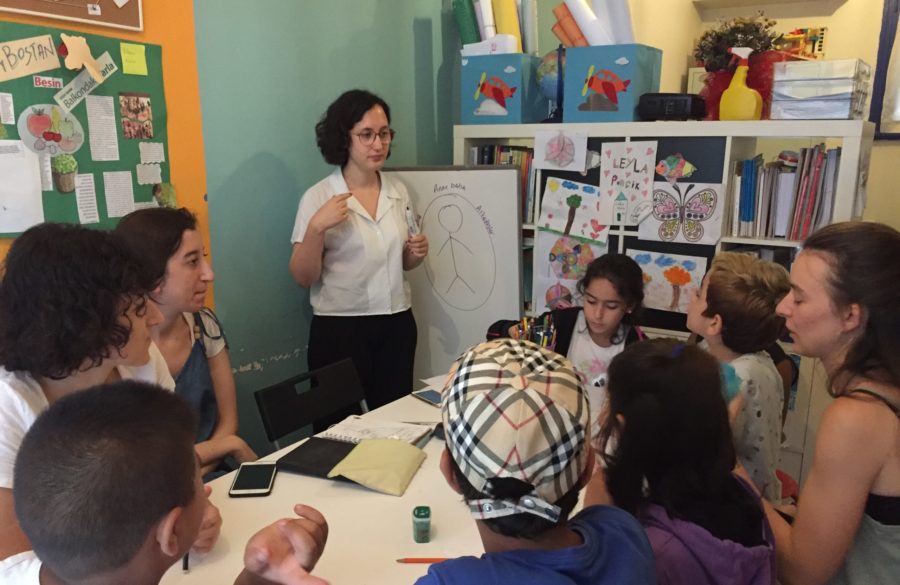
[vc_row][vc_column][vc_column_text]
Sulukule Volunteers Association (Sulukule Gönüllüleri Derneği) is receiving a core grant from our Children’s Fund to strengthen its financial sustainability and increase the number of its individual and corporate donors by employing a fundraising coordinator who will be responsible for developing new fundraising methods and tools.
Read below our interview:
Our readers are familiar with your association’s work with at-risk, disadvantaged and discriminated groups, primarily to prevent school dropouts and raise awareness among women and children about their rights. In line with these priorities, what are your plans for 2022?
We have planned our activities to support the well-being of children in 2022. We have also designed activities that will involve caregivers to empower stakeholders related to children. In this context;
We will organise workshops and psychosocial support activities with children and youth throughout the year, using game-based learning methods. At the same time, with case studies, we will identify children who dropped out of school during the pandemic and whose ties have weakened with the school and include them in the activities.
With caregivers, we will continue to organise literacy classes in-person at the association and over the phone, as well as the psychosocial support activities that we started during the pandemic. Moreover, we will provide legal support on issues such as acquiring identity cards, school enrollment and in cases of criminal incidents.
In the parent meetings organised by the Ministry of National Education, we will conduct workshops for caregivers on supporting their children in attending school, particularly after the pandemic throughout the whole education year. Also, we will work systematically to strengthen our donation system to increase the rate of individual donations in our overall income for 2022.
Children who did not feel academically successful and were away from peer and teacher support experienced adaptation problems with the start of face-to-face education.
Can you tell us about the changes caused by the start of face-to-face education in schools in the region where you work?
We witnessed that the children who were physically away from the school environment needed support to get used to school and adapt to their peers. During distance education, many children’s ties with the school were either weakened or broken.
As Sulukule Volunteers Association, we will conduct case studies to identify children whose ties with the school have weakened and investigate the reasons behind this. We will update the content of our activities to meet the needs accordingly. Also, even though schools have switched to face-to-face education, COVID-19 remains a serious concern for children and caregivers. On the other hand, income loss is quite common for many families, and because of this, we decided to carry out activities to support children’s physical, social and cognitive empowerment and well-being.
Many children had to take a break from or drop out of school due to distance education and different problems faced during the pandemic. Can you share your observations about school dropouts?
Children who did not have a strong connection with the school before the pandemic had their ties seriously weakened. The necessary work to identify and support these children was not carried out adequately. Children who did not feel academically successful and were away from peer and teacher support experienced adaptation problems with the start of face-to-face education. We also received feedback that caregivers and children were concerned about the risk of COVID-19 and felt that the measures taken were insufficient.
Core grants empower local CSOs that work with limited human resources. This way, an opportunity is created to prevent the organisation from being left without a roadmap, preparation and resources after the grant period ends.
With the core grant support you received under our Children’s Fund, you will work on strengthening the association’s financial sustainability. Can you tell us about the activities you will carry out in this context?
We aim to improve our individual donation system. This way, we plan to increase and expand the association’s resources independently of projects and grants. To ensure the continuity of the organisation’s activities, we aim to create opportunities for the employees to continue working long-term, for the association to maintain its current centre, and to allocate time for planning activities effectively without worrying about fundraising.
Sulukule Volunteers Association also works as a community centre. What kind of difficulties do associations working at the local level in Turkey face in terms of fundraising? Do you think that the fundraising activities you will implement with this grant support can serve as a model for civil society organisations (CSOs) doing similar work?
We have adopted a long-term and multi-faceted working method involving different stakeholders to realise the changes we aim to achieve. Difficulties that we encounter regarding fundraising are the high expectations of donors in terms of the number of beneficiaries, the willingness of donors to support activities that only directly target the beneficiaries, but not the administrative expenses of the organisation such as salaries and rent, and the existence of mostly short-term grants.
Core grants empower local CSOs that work with limited human resources. This way, an opportunity is created to prevent the organisation from being left without a roadmap, preparation and resources after the grant period ends.
About Sulukule Volunteers Association
Sulukule Volunteers Association was established in 2010 by volunteers working in the Sulukule urban transformation area, as part of the Sulukule Platform. The association aims to create child-friendly spaces with participatory methods, empower children socially and psychologically through rights-based studies in school, develop models with a holistic approach to prevent school dropouts and raise awareness about women’s and children’s rights.
[/vc_column_text][/vc_column][/vc_row]



